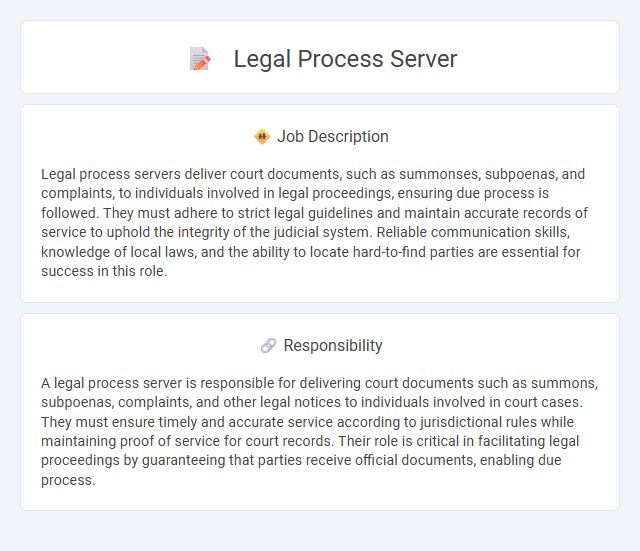
Legal process servers deliver court documents, such as summonses, subpoenas, and complaints, to individuals involved in legal proceedings, ensuring due process is followed. They must adhere to strict legal guidelines and maintain accurate records of service to uphold the integrity of the judicial system. Reliable communication skills, knowledge of local laws, and the ability to locate hard-to-find parties are essential for success in this role.
Individuals who are comfortable with active, on-the-go work and possess strong interpersonal skills may find a legal process server role suitable, as it often involves delivering important documents directly to recipients. Those who prefer routine, desk-bound tasks or are uncomfortable with confrontation might face challenges in this position, given the need to navigate varied environments and sometimes reluctant individuals. The job likely requires a resilient and organized mindset, as persistence and attention to detail are crucial for proper legal compliance.
Qualification
A Legal Process Server must possess a high school diploma or equivalent, with some positions requiring prior experience in the legal or law enforcement fields. Strong knowledge of local and state laws governing service of process is essential, alongside excellent communication and organizational skills to accurately deliver legal documents. Certification or licensing varies by jurisdiction, often necessitating background checks and successful completion of training programs to ensure compliance and professionalism.
Responsibility
A legal process server is responsible for delivering court documents such as summons, subpoenas, complaints, and other legal notices to individuals involved in court cases. They must ensure timely and accurate service according to jurisdictional rules while maintaining proof of service for court records. Their role is critical in facilitating legal proceedings by guaranteeing that parties receive official documents, enabling due process.
Benefit
Working as a legal process server likely offers flexible hours and the potential for independent work, which can be appealing for self-motivated individuals. The role probably provides a steady demand for services, contributing to job stability in the legal field. Additionally, process servers might benefit from opportunities to develop strong knowledge of legal procedures and local laws.
Challenge
A legal process server job may present the challenge of locating hard-to-find individuals who are evading service, requiring persistence and resourcefulness. There is a probable need to navigate complex legal requirements and regulations to ensure documents are served properly and admissibly. The role often involves unpredictable schedules and potentially risky situations, demanding strong problem-solving skills and resilience.
Career Advancement
Legal process server careers offer substantial opportunities for advancement through gaining certifications such as Registered Process Server (RPS) or Certified Process Server (CPS). Increasing expertise in court procedures and legal documentation handling can lead to higher-paying roles including supervisory or managerial positions within reputable legal firms. Continuous professional development and networking with legal professionals enhance prospects for specialization in complex service areas like foreclosure or civil litigation.
 kuljobs.com
kuljobs.com